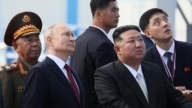【新唐人2011年5月6日讯】“美中战略与经济对话”将于下周在华盛顿举行,人民币汇率问题仍然是讨论重点。美国财政部长盖特纳希望人民币加快升值,而学者认为,中共政府的性质决定了它不能自由放开人民币汇率。
第三轮“美中战略与经济对话”美方将由国务卿和盖特纳领衔,中方由国务院副总理王岐山带头,届时美中将就事关两国关系发展的一系列问题展开磋商。
美国财政部长盖特纳在最近表示,他将促使中国的官员实行一系列经济改革,包括实行更灵活的、以市场力量驱动的汇率,和改善美国企业在中国的投资环境等。
盖特纳还说,这次会谈的焦点还是人民币与美元的汇率问题,人民币升值对抑制中国的通货膨胀有利,同时也可以防止中国国内的房地产泡沫继续膨胀,目前中国领导人也认识到了这一点。
不过,旅美经济学家何清涟表示,人民币升值只能减少今后外汇储备的增加,影响国内货币存放数量。最可能的结果就是抑制了出口,但是对抑制物价上涨所起的作用有限。
盖特纳承认,中国自去年6月以来,允许人民币对美元的汇率上升了大约5%,但美国国会议员和生产厂家认为,人民币币值被压低了多达40%,使中国商品在世界市场上特别便宜。
北京大学“中国宏观经济研究中心”的经济学家黄益平,对美国《华尔街日报》表示:中国领导人仍严格控制人民币的升值步伐,平均每个月升值0.5%左右。他认为,人民币的自由浮动可以是有条件的浮动,让市场决定汇率高低。现在央行官员赞同他的观点,但决定权在高层领导人。
中共高层为什么不能放开人民币汇率呢?
经济时政评论家草庵居士认为,人民币汇率的根本问题在于,国际贸易中各个国家都实行自由汇率,而中共政府控制汇率,这就造成众多贸易上的不平衡,扰乱了全球经济秩序。并且,中共政府把老百姓海外挣到的每一分钱都要交给政府,然后对内印发钞票。这样中共政府有了大笔外汇储备,成了它手中的一个主权基金了。
草庵居士(经济时政评论家):“所以看到这点就知道中国外汇制度的存在,中国(共)政府不愿将外汇制度改为自由外汇制度,不愿意让老百姓手中握有外汇,它根本想利用这笔钱维持自己的统治,这是关系到中共命运的一个大的事情。所以在这点上,中国(共)政府在整个外汇制度上,他们寸步不让,想办法在维持自己的政权底线。”
有人认为,如果人民币升值将大大影响中国的出口,因此反对人民币升值。对此,黄益平说,要让中国在将来能够强劲增长,就得让出口企业学会生产附加值更高的产品,或者是将生产从沿海地区向工资水平更低的内地搬迁,这才是实现可持续增长的办法。
新唐人记者宋风、周平综合报导。
======
Exchange Rate Still in Focus
Next week U.S.-China strategic economic dialogue
will be held in Washington D.C. and RMB
exchange rate is still in the focus. Geithner,
the U.S. Treasury Secretary hopes that RMB
appreciation will accelerate. Scholars believe
however, that the Chinese government
will not let go of the RMB exchange rate.
“US-China Strategic Economic Dialogue" led in its
3rd round by US Secretary of State and Geithner,
and Chinese Vice Premier Wang Qishan, will work
on issues of bilateral relations development.
Geithner said recently that he would urge Chinese
officials to implement a series of economic reforms,
including introducing more flexible exchange rates
driven by market forces, and improving
U.S. companies investing environment.
Geithner also said the focus of this talk will be
the currency exchange rate of RMB to USD.
RMB appreciation is good to curb China’s inflation,
also it can prevent expanding of real estate bubble
in China. Chinese leaders also recognize this.
U.S. economist Ho Qinglian said RMB appreciation
can only curb foreign exchange reserves, reducing
domestic money deposited. Most likely it can inhibit
the export, but effect on price increases is limited.
Geithner acknowledged that since last June, China
has allowed the rate of RMB to USD to increase
by about 5%. U.S. congressmen and manufacturers
believe RMB value was down by as much as 40%,
making Chinese goods on markets very cheap.
Huang Yiping, an economist in China’s
Macroeconomic Research Centre in Peking Univ.
told Wall Street Journal that Chinese leaders still
tightly control RMB appreciation with 0.5% a month
on average. He believes that RMB could float freely
with conditions letting the market determine its level.
Central bankers agree with his views,
but senior leaders are in control of the decisions.
Why the Chinese Communist Party’s (CCP)
top levels do not free the exchange rate?
Buddhist Hermitage, a politeconomy critic believes
the fundamental issue is that only CCP and China
out of all countries does not use free exchange rate
in international trades, causing trade imbalances
and disrupting global economic order.
The Chinese government demands every penny
earned overseas and then prints more money.
The government thus owns a large
foreign exchange reserve as a sovereign fund.
Buddhist Hermitage said, “From this we know how
China’s foreign exchange system exists. China
(CCP) is reluctant to free foreign exchange system,
unwilling to let the people hold foreign exchange.
CCP wants to use the money to maintain its rule,
related to its fate. On foreign exchange rate
China (CCP) is unwilling to compromise and tries
to find ways to maintain its political power."
Some people think RMB appreciation will greatly
affect China’s exports, so they go against it.
Huang Yiping said that to make export enterprises
have strong growth, one must learn to produce
higher value-added products, or move production
from the coastal area to mainland
where wage level is lower.
This is the approach to achieve continuous growth.
NTD reporters Song Feng and Zhou Ping.


























